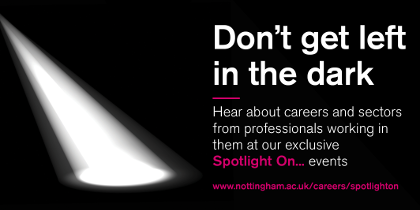
June 5, 2015, by Laura Estrop
Spotlight On: Science and the Media
By Frances Moxham, student blogger and student of medical physiology and therapeutics.
When I stumbled across an email inviting students to attend the Spotlight On… Science and the Media, I immediately responded saying, “Yes please”. The job role of ‘Science Communication’ was something I had never heard of prior to a careers meeting at the start of my third year. Intrigued, I spent a lot of time looking at various masters courses and job advertisements, but still wasn’t entirely sure what a ‘Science Communicator’ exactly did. What better way to find out than attend a talk delivered by an alumna of The University of Nottingham who has had great success in such a role?
Fran Scott describes herself as “a qualified scientist who can describe the subject to everyone and anyone who is interested, even those who think they’re not”. Starting out her career at London’s renowned Science Museum and working her way up to presenting for the BBC, Fran is currently enjoying a flourishing career.
She explained how her career started out by telling us how many people she had to blind-call to get herself jobs, she then dissected her “job” down into all the different roles she does as a Science Communicator. These roles ranged from presenting, consulting, writing and even directing. It wasn’t what I expected to hear… in fact, it was far more interesting. I made a ton of notes and left the event with some excellent advice, which I would like to share.
Fran’s top tips:
Cheeky emails get you further than you might think
Fran made it clear that sending out emails to people she wanted to work with, but had not yet met, was one way she made herself lots of contacts in the industry. She mentioned that persistence is key when it comes to getting a response, as quite often the people you might email are in popular demand and therefore inundated with messages on a daily basis. She stressed that having a searchable ‘email subject’, such as your name, was a great way to get yourself remembered. Subjects such as ‘internship’ or ‘jobs’ were something she recommended steering clear of. Her tip about a BBC employee’s email address always being firstname.surname@bbc.co.uk was one that I wrote down in bold letters.
Find out what you are good at and work with it; “What did you ‘play’ when you were 10 years old?”
When Fran said this I immediately chuckled to myself, envisaging all the “newspapers” I had started up as a child; the garden shed made an excellent head-office and my little brother an excellent runner. I think the reasoning for her point about utilising your natural abilities, improving upon them and then using them as a platform to excel in your career was self-explanatory. She evidently enjoyed communicating to us why she loved her job and her ability to remain so engaging whilst doing this is probably what makes her so good at it.
Start from the bottom, work your way in… and then up
Fran’s attitude of “no job is really a full-time job” reminded me of how relentless you need to be to get to where you want in life. She explained that she would spend her weekends and annual leave, working for free as a Runner on various TV sets, just so she could meet the right people.
Sell yourself; don’t exaggerate
However tempting it might be to get creative on your CV, stick to writing about what you have actually done, not what you think people want to hear.
Under sell, over deliver! (My personal favourite)
This really resonated with me. Telling people about your skill set is one thing, but demonstrating it (especially if it contains skills that you didn’t necessarily fore-warn people about) really gives you the opportunity to prove your worth.
If you’re interested in a career in science or the media, you can book an appointment with one of our careers advisors to have a one-on-one discussion. If you would like to know more information about careers in these sectors, visit our Types of jobs pages.
No comments yet, fill out a comment to be the first

Leave a Reply